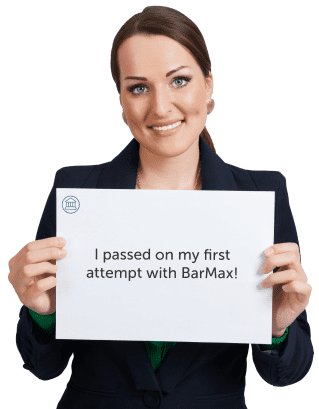Before the mid-1800s
Prior to the mid-1800s, there were no bar exams. Instead of this grand exam that you are studying for, future lawyers-to-be would gain their experience and credentials through apprenticeships, self-studying, and oral exams.
The First Bar Exam in Massachusetts
In 1885, Massachusetts became the first state to employ a written version of the bar exam. But, even so, back then the bar exam only consisted of essays until the Multistate Bar Exam (MBE) was added to the bar exam in February 1972. The MBE was developed by the National Conference of Bar Examiners (NCBE) as a way to both increase efficiency of grading and aid in ensuring as much fairness as possible.
So back in the olden days, students who desired to become attorneys didn't have to have months of sleepless and stress-filled lives studying their days away, after graduating three years of law school, just so that they could pass the bar exam.
Think about this, to become a lawyer, all Abraham Lincoln, our esteemed 16th president, was required by Illinois law to do was to 'obtain certificate procured from the court of an Illinois county certifying to the applicant's good moral character.' That was all. He just needed someone from any court of any Illinois county to place their stamp of good confidence in good ole Abe's character. What if all you needed to become a lawyer was proof of your moral character- Well, that'd be great for you; you, of course, deserve to be handed your attorney-ship no questions asked. But, what about all the other people?!? We can't just allow justice to be the hands of anyone who passes a test of moral character. That was the 19th-century standard and while it was sufficient for our 16th president, we now live in more complicated times and more and more people need to prove that their knowledge is sufficient to wield the powerful sword of the attorney.
The Bar Exam Today
Today, as you very well know, you must first get into law school by taking a grueling exam known to all of you bar exam hopefuls as the LSAT. Remember those simple days- Then you had to apply to law school, choose a law school and attend and pass three taxing years of a very competitive curve-graded school. Once you finish those three years, you're then faced with a multi-day exam. The California bar exam is comprised of three days: the first day is three essay questions and a performance test, the second day is 200 MBE questions, and the third day is again three essay questions and one performance test. The California bar exam is considered to be one of the hardest bar exams. The exam currently tests 14 different subject areas ranging from Constitutional Law to Torts to Professional Responsibility to Remedies.
But, to stop you from jumping off that ledge, you should have some perspective. It's true that your plight as a bar exam hopeful today is much more dire than it may have been a few hundred years ago, however, the American Bar exam is in no way the hardest route one can take to become an attorney. In Germany, there are two exams you must pass after law school. If you pass the first one, you continue on to a two-year apprenticeship and then you must pass a second exam. You are only allowed to take each exam twice and if you fail both times you are no longer allowed by law to take the exam. Therefore, if you fail twice, you are no longer allowed to become a lawyer, even though you have given years of your life to the study of law. Perspective.
Hope that was both informative and spirit-lifting!
Happy Studying!
Try the #1-Rated Bar Review for Free.
| 1,950+ REAL MBE Questions | |
| 100+ hrs of Lectures | |
| 125K+ Students | |
| 600+ Flashcards | |
| Higher Score Guarantee** |

Free Practice MBE Quiz
Assess your legal knowledge with this free MBE practice quiz.
After being fired from his job, Mel drank almost a quart of vodka and decided to ride the bus home. While on the bus, he saw a briefcase he mistakenly thought was his own, and began struggling with the passenger carrying the briefcase. Mel knocked the passenger to the floor, took the briefcase, and fled. Mel was arrested and charged with robbery.
Mel should be

